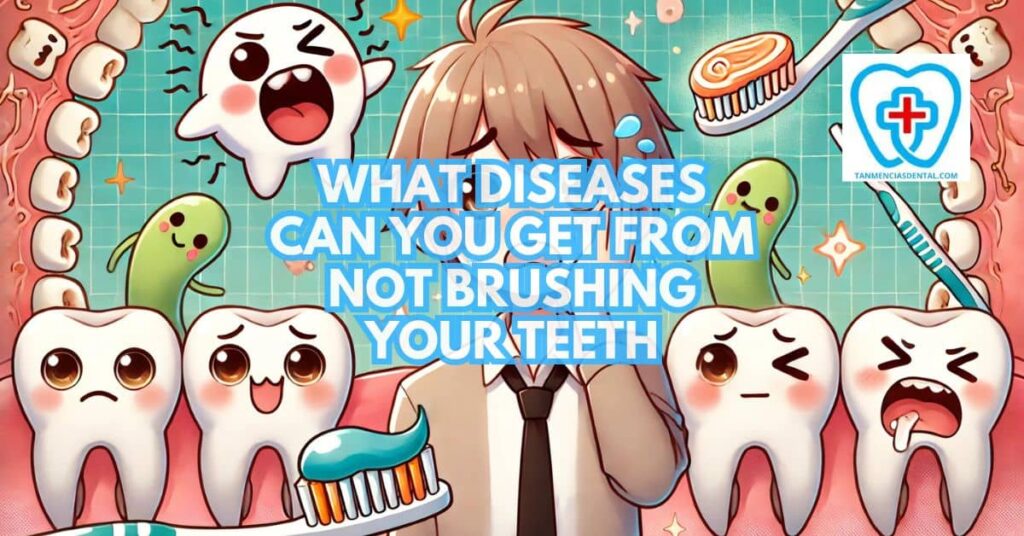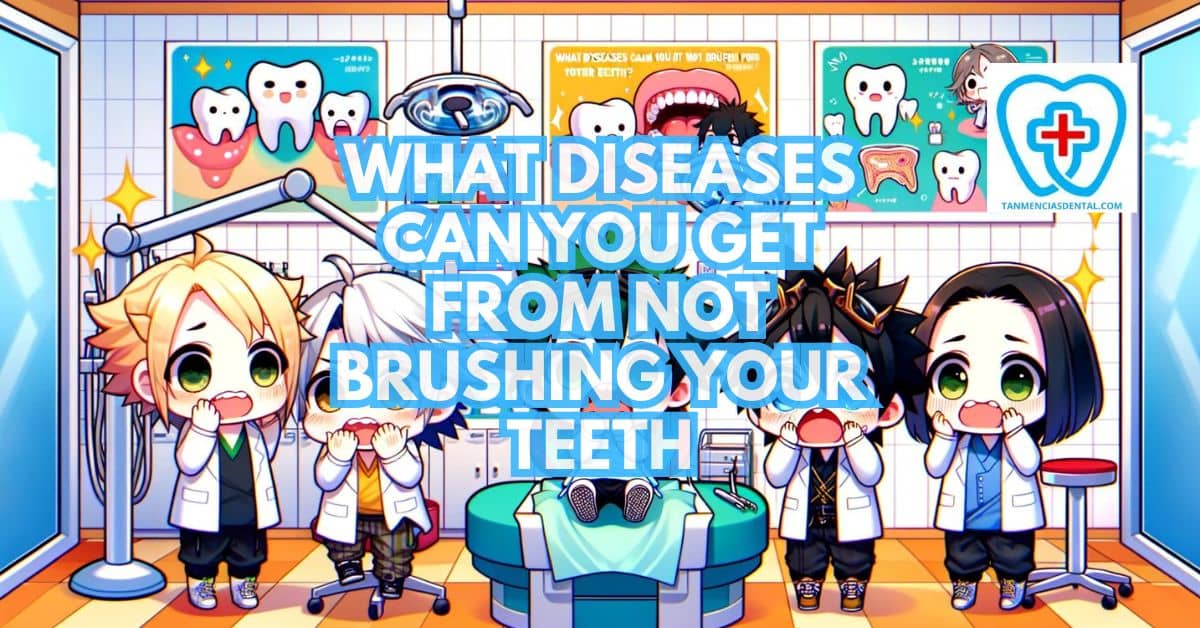Neglecting to brush your teeth does more than just cause bad breath; it creates the perfect environment for harmful bacteria to thrive.
Over time, these bacteria form plaque, which can lead to tooth decay, gum disease, and other serious oral health problems.
But the effects don’t stop there—poor dental hygiene can also contribute to issues like heart disease, diabetes, and respiratory infections.
Understanding what diseases can you get from not brushing your teeth highlights the critical role oral care plays in protecting your entire body.
Brushing regularly is a simple yet powerful way to prevent these risks and maintain overall well-being.
1. From Gingivitis to Tooth Loss: How Gum Disease Progresses
Gingivitis is the earliest stage of gum disease, where red, swollen gums may bleed when you brush or floss.
This condition is caused by plaque buildup due to poor dental hygiene and, if not addressed, can lead to cavities and more serious gum problems.
If gingivitis is ignored, it can worsen into periodontitis, a serious infection that affects the tissues and bone supporting your teeth.
In time, this can result in tooth loosening and eventual tooth loss.
To prevent this progression, it’s important to brush twice daily with fluoride toothpaste and floss regularly to remove plaque and food particles.
Regular dental checkups and cleanings also play a crucial role in keeping your gums healthy and catching early signs of disease.
By maintaining good oral care habits, you can protect your teeth and gums from lasting damage.
🦷 How to Find an Affordable Oral Surgeon Without Losing Quality Care
2. More Than Just a Smile: How Oral Health Impacts Your Body
The impact of poor oral health extends well beyond the mouth, affecting your entire body’s wellness.
Bacteria from infected gums and decaying teeth can enter the bloodstream and travel to various organs, potentially causing or exacerbating systemic diseases.
Individuals with periodontal disease have been found to have a higher risk of cardiovascular disease and stroke.
Additionally, poor oral health is linked to complications in managing diabetes and respiratory conditions.
This interconnectedness highlights why oral health is a critical component of overall health.
🦷 Essential Tools for Cleaning Your Teeth
3. How Poor Oral Health Affects Your Mood and Confidence
When your teeth and gums are unhealthy, it can make you feel bad about yourself.
Bad breath and missing teeth can make you shy and nervous around others.
You might avoid smiling or talking because you’re worried people will notice your dental problems.
These feelings can lead to sadness or even depression over time.
Taking care of your teeth helps you feel happier and more confident every day.
🦷 Top Qualities to Look for in a Child-Friendly Dentist
4. Mouth to Body: How Bacteria From Your Teeth Can Travel
Neglecting tooth brushing allows bacteria to flourish in your mouth, setting the stage for them to travel beyond local confines.
These bacteria can enter the bloodstream through bleeding gums, reaching distant organs and tissues.
Once in the bloodstream, these microorganisms can contribute to systemic inflammation and diseases such as endocarditis, an infection of the inner lining of the heart chambers and valves.
Moreover, oral pathogens are linked to increased risks of developing arterial plaques and influencing conditions like arthritis.
Regular brushing minimizes the presence of these harmful bacteria, significantly reducing the risk of their migration.
🦷 Can You Brush Your Teeth With Your Fingers?

5. Trouble Breathing? Unclean Teeth Might Be Why
Poor oral hygiene can be a contributing factor to respiratory issues.
When teeth are not regularly cleaned, the bacteria in plaque can proliferate and be inhaled into the lungs.
This can lead to respiratory infections, pneumonia, or exacerbate conditions like chronic obstructive pulmonary disease (COPD) and asthma.
The continuous inhalation of oral pathogens is particularly dangerous for individuals with weakened immune systems or existing respiratory conditions.
Thus, maintaining good dental hygiene is crucial not just for oral health but also for preventing potential respiratory complications.
🦷 How Comprehensive Dental Care Improves Overall Health
6. Pregnancy and Oral Health: A Potential Connection
During pregnancy, women experience hormonal changes that can increase their susceptibility to oral infections such as gingivitis and periodontitis.
These oral health issues are not just a concern for the mother’s health; they have been linked to adverse pregnancy outcomes, including preterm birth and low birth weight.
Ensuring good oral hygiene and regular dental checkups during pregnancy can help reduce these risks.
In addition, the bacteria causing gum disease can enter the bloodstream and potentially affect the unborn child.
Pregnant women should be particularly diligent about their oral care routines to protect both their health and that of their baby.
🦷 How to Brush Your Teeth Correctly for a Healthier Smile
7. Brushing for Blood Sugar Control? The Link Between Gums and Diabetes
For individuals with diabetes, maintaining oral health is particularly important, as there is a bidirectional relationship between diabetes and gum disease.
Poor gum health can exacerbate blood sugar fluctuations, complicating diabetes management.
Conversely, well-controlled diabetes leads to a lower risk of severe periodontal disease.
Regular tooth brushing and flossing can help manage gum health and thus aid in stabilizing blood glucose levels.
Diabetic patients should be vigilant about oral hygiene practices to ensure better overall health outcomes.
🦷 Is It Safe to Brush Teeth With Salt and Toothpaste? Pros and Cons
8. Brushing Basics: The Importance of a Good Brushing Routine
The foundation of dental health lies in a consistent and thorough brushing routine.
To protect your teeth, it’s important to brush your teeth twice a day using fluoride toothpaste, which helps to remove plaque and prevent cavities.
Plaque is a sticky film of bacteria that builds up on your teeth and gums, leading to tooth decay and gum disease if not properly cleaned.
Using the right toothbrush—whether manual or electric—and applying the correct brushing technique ensures that all surfaces of your teeth are cleaned effectively.
It’s equally important to replace your toothbrush every three to four months or sooner if the bristles start to fray, as worn-out bristles are less effective at cleaning.
Besides brushing, you should clean your teeth regularly by flossing and rinsing with mouthwash to remove food particles and bacteria from areas your toothbrush can’t reach.
Lastly, don’t forget to visit your dentist at least twice a year for professional cleanings and checkups to catch any potential problems early and maintain optimal oral health.
🦷 Can You Brush Your Teeth With Vinegar? Pros, Cons, and Alternatives
9. Don’t Forget to Floss! Why Flossing Matters for Oral Health
Flossing plays a crucial role in oral health, reaching areas between the teeth and under the gumline that a toothbrush cannot reach.
By removing plaque and food particles from these areas, flossing helps prevent the development of cavities and gum disease.
It also reduces the risk of bad breath and helps maintain stronger, healthier gums.
Neglecting to floss can allow plaque to harden into tartar, leading to inflammation and gum disease, which can have broader health implications.
Incorporating daily flossing into your oral hygiene routine is essential for comprehensive dental care.
🦷 Why Community Dental Care Matters and How Local Clinics Help
10. Prevention is Key: Scheduling Regular Dental Checkups
Regular dental checkups are vital for maintaining oral health and the early detection of potential issues.
Dentists can identify early signs of tooth decay, gum disease, and other oral health problems before they become more serious and costly to treat.
These visits typically include a professional cleaning, which removes tartar and plaque that regular brushing and flossing might miss.
Regular checkups also provide an opportunity for dentists to provide guidance on proper oral hygiene techniques and preventative measures.
Staying proactive with dental appointments is a key strategy for preventing oral diseases and ensuring long-term health.
🦷 The Surprising Benefits of Salt for Teeth: Natural Secrets for a Healthy Smile
11. The Impact of Oral Bacteria on Heart Health: Connecting the Dots
There is a significant link between oral health and heart health, underscored by research showing that oral bacteria can affect the heart.
These bacteria can cause inflammation and contribute to the development of atherosclerosis, where plaque builds up in the arteries, potentially leading to heart attacks and strokes.
Good oral hygiene practices, like regular brushing and flossing, can reduce the presence of these harmful bacteria.
The systemic connection between oral and cardiovascular health suggests that maintaining oral hygiene is a critical aspect of preventing heart disease.
Thus, protecting your oral health is an important part of protecting your heart health.
🦷 Tan-Mencias Dental Clinic in Marikina City
👨⚕️ Conclusion
Regular tooth brushing is a simple yet powerful way to protect against a multitude of diseases.
It’s more than just a practice for maintaining a clean smile; it’s essential for overall health.
The wide-reaching effects of oral diseases on the body illustrate the importance of consistent oral hygiene.
By prioritizing daily brushing, flossing, and regular dental checkups, you can safeguard not only your oral health but also your general well-being.
Embrace these habits to ensure a healthier future and prevent diseases that can arise from poor oral care.
😊 Self-Promotion
Visit us at Tan-Mencias Dental Clinic, your local source for top-notch dental care right here in Parang, Marikina City.
Our friendly team is ready to ensure you receive personalized and comfortable dental treatment that will make you smile!
You can easily reach out to us with any questions or to schedule an appointment through our website’s contact form, by sending a message to our Facebook page, or by calling us directly at 9171451074.
We’re more than just a dental clinic; we’re your partners in maintaining your oral health.
Let us help you achieve and maintain a healthy, beautiful smile with ease and confidence!

